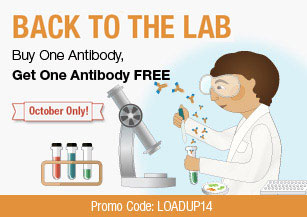Back To The Lab! One Week Left!
|
Receive a complimentary antibody with
✓ 9,000+ Monoclonal and Polyclonal Antibodies. One Week Left! |
 |
- 1. Select your Crown Antibody (400 µl) and place your order online
- 2. Add a loading control (80 µl) to the cart.
- 3. Enter promotion Code: Loadup14 before checkout.
- 4. You may also place orders via email to orders@abgent.com or fax to 858-622-0609.
- 5. Reference promotion code Loadup14 when placing your order.
| Current Promotions | Crown Antibodies | Custom Services |
*The Back to the Lab Promotion "Buy One Antibody (400 µl), Get One Antibody (400 µl) Free" applies exclusively to catalog numbers beginning with AM and AP. Customers must purchase at least one full size vial (400 µl) of an eligible antibody to participate in this promotion, and must claim the second antibody of a different catalog number at time of order. The promotion is valid from October 1st to October 31st, 2014. Abgent reserves the right to cancel or modify this offer at any time. The promotion applies to all direct customers in the United States. Promo code "Loadup14" must be given at time of order. Discount not given for previously placed orders. This promotion cannot be combined with any other offers and is void where prohibited.














 Foundational characteristics of cancer include proliferation, angiogenesis, migration, evasion of apoptosis, and cellular immortality. Find key markers for these cellular processes and antibodies to detect them.
Foundational characteristics of cancer include proliferation, angiogenesis, migration, evasion of apoptosis, and cellular immortality. Find key markers for these cellular processes and antibodies to detect them. The SUMOplot™ Analysis Program predicts and scores sumoylation sites in your protein. SUMOylation is a post-translational modification involved in various cellular processes, such as nuclear-cytosolic transport, transcriptional regulation, apoptosis, protein stability, response to stress, and progression through the cell cycle.
The SUMOplot™ Analysis Program predicts and scores sumoylation sites in your protein. SUMOylation is a post-translational modification involved in various cellular processes, such as nuclear-cytosolic transport, transcriptional regulation, apoptosis, protein stability, response to stress, and progression through the cell cycle. The Autophagy Receptor Motif Plotter predicts and scores autophagy receptor binding sites in your protein. Identifying proteins connected to this pathway is critical to understanding the role of autophagy in physiological as well as pathological processes such as development, differentiation, neurodegenerative diseases, stress, infection, and cancer.
The Autophagy Receptor Motif Plotter predicts and scores autophagy receptor binding sites in your protein. Identifying proteins connected to this pathway is critical to understanding the role of autophagy in physiological as well as pathological processes such as development, differentiation, neurodegenerative diseases, stress, infection, and cancer.